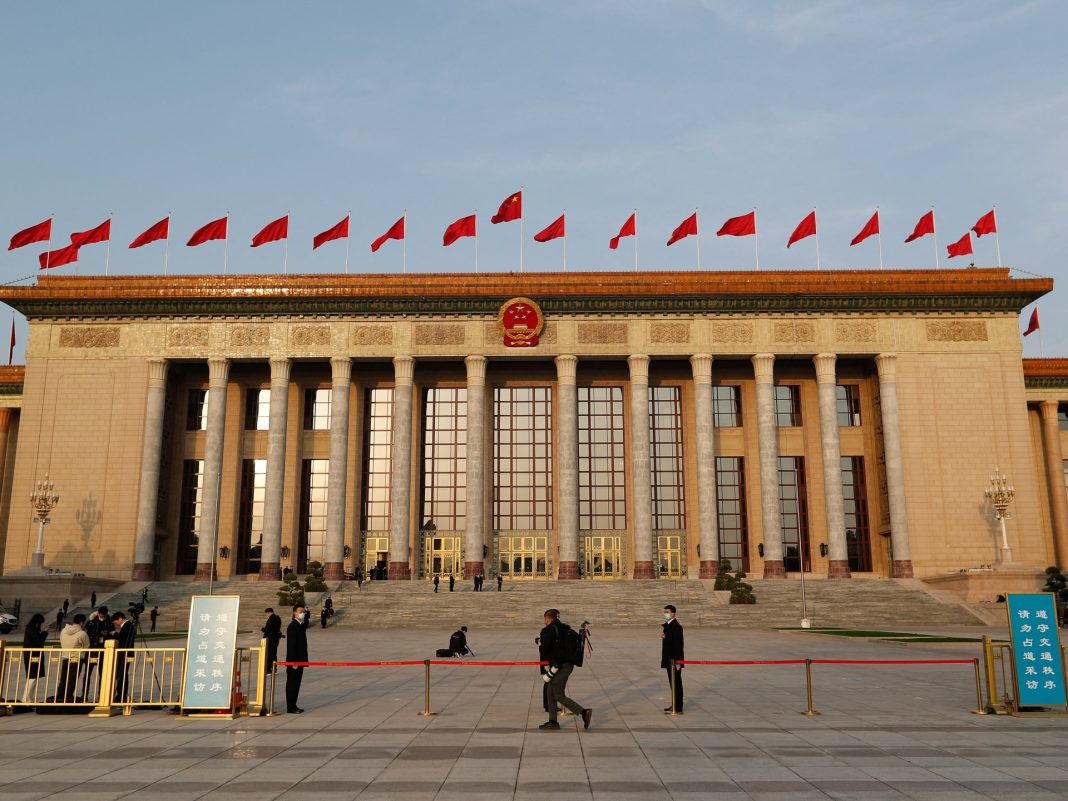Taipei, Taiwan – China’s “Two Sessions” kick off in Beijing on Monday with the meeting of the National People’s Congress (NPC) and the Chinese People’s Political Consultative Conference (CPPCC).
The event brings together China’s political elite, as well as leaders in business, tech, media, and the arts.
Known as lianghui in Chinese, the concurrent meetings are an annual fixture of China’s legislative agenda and run for approximately two weeks.
During the period, legislators will approve new laws, political appointments, and government work reports detailing the progress of various departments such as the Ministry of Finance and the National Development and Reform Commission.
What are the major developments to watch?
During last year’s Two Sessions, delegates officially approved Xi Jinping for an unprecedented third term as president.
This year, the event is likely to be dominated by China’s lagging economy, which is grappling with slowing growth, deflation, massive debt and falling exports.
One of the most important events to watch will be Premier Li Qiang’s delivery of the annual work report, which will review the government’s accomplishments and set goals for 2024.
Li is expected to set an economic growth target of about 5 percent for 2024 and discuss headline issues from China’s falling birth rate to the future of tech and artificial intelligence (AI) regulation.
A number of key appointments could also be made.
Over the past year, 11 members of the NPC’s Standing Committee – the legislature’s 175-member permanent body – have been removed, including Minister of Foreign Affairs Qin Gang and Minister of Defence Li Shangfu.
Those who were removed had ties to the military, including the People’s Liberation Army (PLA) Rocket Force, which oversees China’s nuclear and conventional ballistic missiles.
What is the difference between the two sessions?
The NPC and the CPPCC are both Chinese state institutions that are technically separate from the Communist Party of China (CCP), but much of their work is dictated by it.
On paper, the NPC is officially China’s highest legislative body with nearly 3,000 members representing the country’s provinces, autonomous regions, big cities, the PLA and the People’s Armed Police. The NPC also has delegates representing self-governing Taiwan, which is claimed by the CCP even though Beijing has never exercised control over the island.
During the NPC, delegates review progress on policy goals and vote to approve new legislation and senior political appointments, although most delegates in reality have little political power.
The NPC Standing Committee is widely viewed as more powerful than the legislature in practice, despite being technically subordinate, as it meets regularly between legislative sessions.
“The NPC is not a parliament in the sense of a democratic parliament where the representatives are elected through fair elections. Its deputies are elected by a small portion of the Chinese population under the guidance of the Communist Party,” Adam Ni, co-editor of the China Neican newsletter, told Al Jazeera.
“That is to say, the deputies of the NPC are at least acceptable to the party.”
The CPPCC, which meets at the same time and brings together 2,000 plus delegates from across China and the diaspora, is a political advisory body that functions as more of a public relations exercise.
Delegates are not necessarily members of the CCP, although the meeting is part of its “United Front” efforts to align different actors on common causes and spread China’s influence.
CPPCC delegates include leaders in tech, the arts, media, and leaders from semi-autonomous Hong Kong and Macau.
“The CPPCC performs several functions, including facilitating elite networking and directing policy advice from outside the party to the party-state. It operates as a means of trade, where the Communist Party provides access to the system and recognition through granting membership, while the elites sitting on the body gain access to policymakers and receive recognition,” Ni said.
Is the NPC just a ‘rubber stamp’ parliament?
The NPC is often referred to as a “rubber stamp” parliament or legislature, as its main function is to formally approve premade decisions and it features little, if any, overt debate.
China watchers say that the NPC is still important to watch.
It can incorporate limited popular input on issues that are not considered too sensitive and, on rare occasions, has featured displays of dissent.
Most famously, one-third of delegates in 1992 voted against or abstained from approving the Three Gorges Dam, a controversial project to dam the Yangtze River.
“People refer to the NPC as a ‘rubber stamp’ because it has never voted down any bill, work report, budget, or nomination presented to it. But that unduly narrow focus on the NPC’s vote outcomes alone, in my view, ignores the important role played by the thousands of NPC delegates in representing citizen interests on a range of politically non-sensitive issues,” Changhao Wei, a fellow at Yale Law School’s Paul Tsai China Center, told Al Jazeera.
While you will not hear delegates debating on the floor, individual delegates and bodies such as the NPC Standing Committee can shape legislation as it is being drafted and provide input on issues like the national budget.
Delegates can also submit individual bills calling on the NPC to act on important issues of the day.
In 2022, delegates submitted multiple bills focusing on women’s rights and domestic violence in response to public outrage over the case of a trafficked woman with mental health issues who was found chained up by her husband.
While these bills were not debated publicly, they would not have gone unnoticed within the government either, Wei said.
Ni said although the CPP maintains an ironclad grip on power, the party is not a monolith, “but contains a multitude of interest groups and networks”.
“There are also non-party groups and personnel involved in the lawmaking process,” Ni said.
“We shouldn’t discount their agency, eg, advocates of women’s rights, environmentalists, because they can have an impact. But the influence and power of non-party individuals and groups are constrained by the political structure, where the party monopolises the instruments of state power.”







